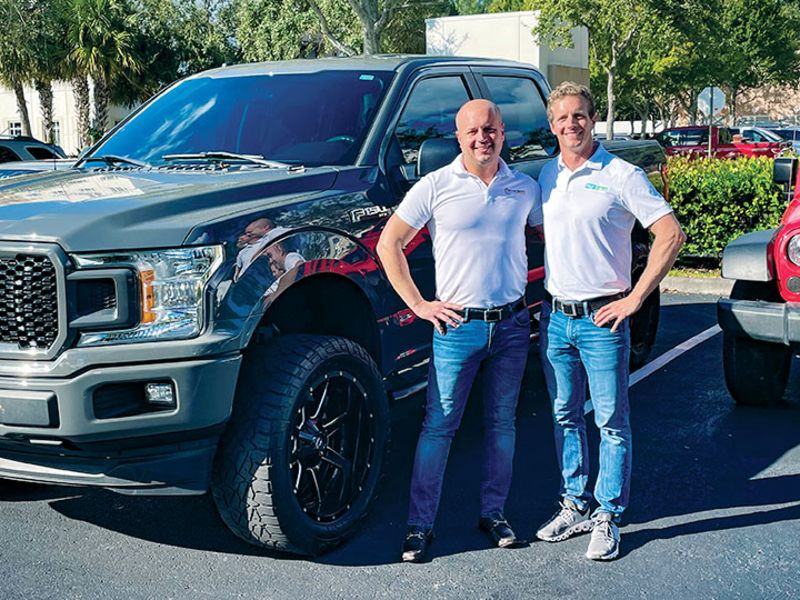
As U.S. auto dealerships continue to grapple with a vehicle supply-demand imbalance that is causing inventories to dwindle, some dealers are searching for any and all ways to get vehicles on their lots.
For Aschenbach Automotive Group in Frederick, Md., establishing a buying center was an alternative way for the company to fill the supply gap and add to its used-vehicle inventory.
“Most of our stores do a pretty darn good job of buying from the public, but this is additional revenue we didn’t have, and it’s really thinking outside of the box,” Conrad Aschenbach, president of Aschenbach Automotive Group, told Automotive News.
The group, which operates five dealerships across Maryland, Pennsylvania and Virginia, plus the buying center in Florida, got its start in 2017 when Aschenbach acquired a Cadillac-Buick-GMC store in Carlisle, Pa., with his father, William.
As a relatively new group with stores spread out geographically, it was struggling with car auctions and establishing relationships in the business, especially during the pandemic, Aschenbach explained.
So in March, Aschenbach and his brother, Lawson, launched the group’s buying center, known as BizCar, in West Palm Beach.
“It turned out that it was a great area to acquire cars,” said Lawson, a professional race car driver who took a sabbatical as COVID-19 spread globally. He’s now BizCar’s director.
“Everybody knows that Florida is a great place to buy cars — low mileage, no rust,” he said. “It’s a great opportunity for dealers to get inventory.”
The group’s Used Car Director Ryan Gray and CFO Kevin Gaynor also were heavily involved in establishing BizCar and getting Lawson “up to speed at a very rapid rate,” Aschenbach said.
The buying center has two full-time employees who scour for leads.
“Our motto is really simple: It’s the simple way to sell your car. So we try to make this as quick as possible, as easy as possible, and create a relationship with a customer who may not want to go to a dealer,” Lawson said.
Forming great relationships with customers has been paramount to the center’s success.
“Probably 20 percent of all our purchases right now are referrals from people we’ve already bought from,” Lawson noted.
The center has purchased everything from 2020 Ram pickups with low mileage to early 2000 BMW Z4 convertibles and will even purchase vehicles with $1 million price tags, Lawson said. Commercial vehicles such as work vans and service body trucks also have been popular purchases.
“We literally look at any car. It doesn’t matter the make, model, year, miles, condition,” Lawson said.
“In this day and age, listen, there’s a shortage. You can’t turn away units. You don’t want to turn away units. We fight for them. I mean, we really want these cars.”
The purchased vehicles are then shipped to the store that is best equipped to sell them. And given the current state of dealer inventories across the U.S., the group’s buying center has given its stores an extra cushion.
“A BizCar retail sale is one of the highest average gross profit transactions at our franchise stores,” Aschenbach said. “And that’s because we’re buying things you wouldn’t find at the auction, and if you did find them at the auction, you’re going to pay over retail right now for that vehicle.”
The group sold 3,586 new and used vehicles in 2020 and 3,000 combined so far in 2021. A few of its stores have a zero-day supply of new vehicles, Aschenbach said, with its lowest days supply of used vehicles hovering around 30.
BizCar, on average, buys around 20 vehicles a month.
Aschenbach and his brother are hoping to automate many of BizCar’s processes, so that potential customers can visit the website and get a value for their vehicle right away.
The group is opening a BizCar retail outlet in Carlisle, Pa., which will consist of a buying center, retail center for preowned vehicles and a storefront, Aschenbach said. It is also in the process of growing its franchise store network as well as adding another buying center in Florida.
With automation and the potential for more buying centers, Aschenbach estimates the group could buy 100-plus retail units a month.
“We see the shortage going well into 2022, maybe 2023,” Aschenbach said. “Going forward, if we come out of this inventory shortage, what we will have is another revenue source for our dealerships.”

